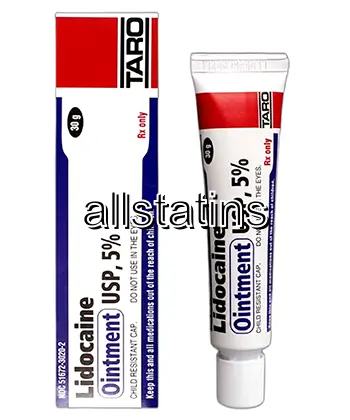| Package | Dosage | Price | Price per Dose | |
|---|---|---|---|---|
| Dosage: 2% | ||||
| 6 tube | 2% | $82.51 | $13.76 | |
| 4 tube | 2% | $73.54 | $18.39 | |
| 2 tube | 2% | $57.39 | $28.69 | |

Xylocaine Description
What is Xylocaine?
Xylocaine, known generically as lidocaine, is a widely used local anesthetic available in the United States through online pharmacies. It is commonly used by healthcare professionals and patients for numbing tissues in specific areas of the body. Xylocaine is effective in providing quick relief during minor surgical procedures, dental work, or for managing pain caused by various skin conditions. Its trusted reputation has made it a popular choice for both medical settings and at-home use for temporary pain relief.
How does Xylocaine work?
Xylocaine works by blocking nerve signals in the area where it is applied. When administered, it temporarily disrupts the transmission of pain impulses along nerve fibers. This results in localized numbness, allowing patients to undergo procedures without experiencing discomfort. In addition to its numbing properties, lidocaine has a calming effect on nerves, making it valuable for managing acute and chronic pain situations. Whether used topically or via injection, its rapid onset elicits quick relief, often within minutes.
Usage and Applications
In the United States, Xylocaine comes in various forms including creams, gels, patches, injections, and sprays. The choice depends on the specific medical or personal needs. For minor skin procedures or dental work, topical formulations are common. Patients often use Xylocaine gel for dental anesthesia, ensuring a painless experience during cavity filling or other dental treatments. The anesthetic patches provide sustained relief for localized pain, such as muscle strains or nerve pain.
In clinical settings, Xylocaine injections are used for nerve blocks, abdominal surgeries, or to manage arrhythmias. Proper application and dosing are vital for safety and effectiveness. Patients should follow dosage instructions carefully and consult healthcare professionals when using it for more serious conditions.
Review and Patient Experiences
Many users in the United States report positive results with Xylocaine. It is appreciated for its quick action and reliable pain relief. Dental patients, in particular, find it invaluable for making procedures more comfortable. Some users note that the topical forms work well for minor skin irritations, such as insect bites or sunburns. When used appropriately, adverse reactions are rare, though some may experience mild skin irritation or allergic responses.
Healthcare professionals emphasize the importance of correct application and dosage to prevent overdose or systemic absorption. Overall, Xylocaine is regarded as a safe, effective, and versatile local anesthetic. Its accessibility through online pharmacies across the country has made it easier for patients to obtain, especially for managing ongoing pain or preparing for minor medical procedures at home.
Safety and Precautions
While Xylocaine is generally safe when used as directed, it is important to be cautious. Overuse or improper application can lead to side effects such as dizziness, ringing in the ears, or even more serious complications like heart issues. Patients with allergies to local anesthetics should avoid using lidocaine unless advised by a healthcare professional. Always check ingredient lists, especially if you have sensitivities or known allergic reactions.
It is recommended to consult a healthcare provider before using Xylocaine, particularly if you are pregnant, nursing, or taking other medications. Proper storage — in a cool, dry place — ensures the medication maintains its efficacy. When purchasing online, ensure the pharmacy is reputable to guarantee you receive genuine, high-quality medication.